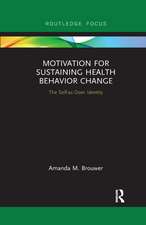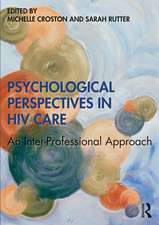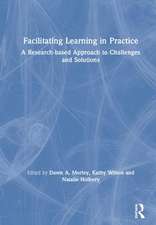Critical Qualitative Health Research: Exploring Philosophies, Politics and Practices
Editat de Kay Arandaen Limba Engleză Paperback – 30 ian 2020
This book offers postgraduate researchers, health researchers and students alike opportunities to engage more deeply with the emergent, complex and messy terrain of qualitative health related research.
| Toate formatele și edițiile | Preț | Express |
|---|---|---|
| Paperback (1) | 231.90 lei 6-8 săpt. | +66.84 lei 7-11 zile |
| Taylor & Francis – 30 ian 2020 | 231.90 lei 6-8 săpt. | +66.84 lei 7-11 zile |
| Hardback (1) | 840.24 lei 6-8 săpt. | |
| Taylor & Francis – 4 feb 2020 | 840.24 lei 6-8 săpt. |
Preț: 231.90 lei
Preț vechi: 295.35 lei
-21% Nou
Puncte Express: 348
Preț estimativ în valută:
44.38€ • 46.54$ • 37.01£
44.38€ • 46.54$ • 37.01£
Carte tipărită la comandă
Livrare economică 07-21 ianuarie 25
Livrare express 03-07 decembrie pentru 76.83 lei
Preluare comenzi: 021 569.72.76
Specificații
ISBN-13: 9781138361263
ISBN-10: 1138361267
Pagini: 230
Ilustrații: 8 Tables, black and white; 1 Line drawings, black and white; 1 Illustrations, black and white
Dimensiuni: 156 x 234 x 15 mm
Greutate: 0.36 kg
Ediția:1
Editura: Taylor & Francis
Colecția Routledge
Locul publicării:Oxford, United Kingdom
ISBN-10: 1138361267
Pagini: 230
Ilustrații: 8 Tables, black and white; 1 Line drawings, black and white; 1 Illustrations, black and white
Dimensiuni: 156 x 234 x 15 mm
Greutate: 0.36 kg
Ediția:1
Editura: Taylor & Francis
Colecția Routledge
Locul publicării:Oxford, United Kingdom
Public țintă
Postgraduate and ProfessionalCuprins
List of Contributors
Preface
Introduction Kay Aranda
1. Qualitative Research and Ideological Pragmatism? A Journey Chris Cocking
2. Case Study Methodology Kay de Vries
3. Qualitative Methods: Challenges and Celebrations of Fieldwork in the Health Care Setting Julie Scholes
4. The Practice of Grounded Theory: An Interpretivist Perspective Julie Scholes
5. Engaging with Grounded Theory Research as a Doctoral Student Heather Baid
6. From Phenomenology to Practice: Theoretical Foundations and Phenomenological Methods Kate Galvin, Oliver Thurlow, and Rebecca Player
7. Phenomenology: Questioning Consciousness and Experience Graham Stew
8. Re-Thinking Ethnography with Practice Theory Debbie Hatfield
9. Autoethnography Alec Grant
10. Post Critical Qualitative Feminist Research: Implications for Participatory and Narrative Approaches Kay Aranda
11. The Reflexive Autoethnographer Alec Grant
Preface
Introduction Kay Aranda
1. Qualitative Research and Ideological Pragmatism? A Journey Chris Cocking
2. Case Study Methodology Kay de Vries
3. Qualitative Methods: Challenges and Celebrations of Fieldwork in the Health Care Setting Julie Scholes
4. The Practice of Grounded Theory: An Interpretivist Perspective Julie Scholes
5. Engaging with Grounded Theory Research as a Doctoral Student Heather Baid
6. From Phenomenology to Practice: Theoretical Foundations and Phenomenological Methods Kate Galvin, Oliver Thurlow, and Rebecca Player
7. Phenomenology: Questioning Consciousness and Experience Graham Stew
8. Re-Thinking Ethnography with Practice Theory Debbie Hatfield
9. Autoethnography Alec Grant
10. Post Critical Qualitative Feminist Research: Implications for Participatory and Narrative Approaches Kay Aranda
11. The Reflexive Autoethnographer Alec Grant
Notă biografică
Kay Aranda is a Reader in the School of Health Sciences at the University of Brighton. Having worked in primary care, public health and community health nursing, her research interests include theory informed-qualitative and feminist research and inequalities related to gender, age and sexuality.
Recenzii
The introduction to this text promises a different perspective on qualitative research in healthcare, and its readers will not be disappointed. It takes a critical stance, and a discussion of the philosophical and political dimensions illuminates the complexities of this type of inquiry which is sometimes forgotten in other texts. The authors are known scholars and researchers in the field of health and social sciences research with a wide range of publications between them.Immy Holloway, Professor Emeritus, Faculty of Health and Social Sciences, Bournemouth University, UK
This edited volume maps contrasting routes to doing empirical qualitative research in health and social care contexts. It critically examines how knowledge is always contested, partial, perspectival and imbued with power relations. Kay Aranda, and her impressive gathering of diverse researcher-practitioners, do a fine job in responding to the call for researchers to be more explicitly reflexive about their choices. Authors explain their preferred methodological and epistemological paths and argue their vision of a society that prioritises anti-oppressive civic values over divisive positivist and market-led ideology. This is a timely contribution, reminding us all to care, question our philosophical assumptions, and engage in critical political debate. This philosophically-informed volume will be an invaluable resource for any doctoral student seeking direction through the bewildering terrain of contemporary qualitative methodologies.
Dr Linda Finlay, PhD, BA(Hons)Psych, MBPsS, DipIntPsych, DipPCSup, Integrative Psychotherapist and Academic Consultant
This is a very interesting and impressive book focusing on critical qualitative research in healthcare, acknowledging the problematic of power and inequalities in how qualitative research has been and is designed from the perspective of the researcher as well as the research participants and the topics and issues researched. There is a great deal in this book for those engaged in qualitative research. The book supports new and novel approaches to qualitative research and this is a refreshing aspect for those looking for new ways to undertake qualitative research. In particular, I liked the consistent theme of co- producing research including the engagement and involvement of lay people and services users at all stages of the research. This is an important book for those who are using or plan to use qualitative research methodologies and it provides many examples of how to carry out credible and rigorous qualitative research.
Dr Anne Arber, Senior Lecturer, School of Health Sciences, University of Surrey, Guildford, UK
This edited volume maps contrasting routes to doing empirical qualitative research in health and social care contexts. It critically examines how knowledge is always contested, partial, perspectival and imbued with power relations. Kay Aranda, and her impressive gathering of diverse researcher-practitioners, do a fine job in responding to the call for researchers to be more explicitly reflexive about their choices. Authors explain their preferred methodological and epistemological paths and argue their vision of a society that prioritises anti-oppressive civic values over divisive positivist and market-led ideology. This is a timely contribution, reminding us all to care, question our philosophical assumptions, and engage in critical political debate. This philosophically-informed volume will be an invaluable resource for any doctoral student seeking direction through the bewildering terrain of contemporary qualitative methodologies.
Dr Linda Finlay, PhD, BA(Hons)Psych, MBPsS, DipIntPsych, DipPCSup, Integrative Psychotherapist and Academic Consultant
This is a very interesting and impressive book focusing on critical qualitative research in healthcare, acknowledging the problematic of power and inequalities in how qualitative research has been and is designed from the perspective of the researcher as well as the research participants and the topics and issues researched. There is a great deal in this book for those engaged in qualitative research. The book supports new and novel approaches to qualitative research and this is a refreshing aspect for those looking for new ways to undertake qualitative research. In particular, I liked the consistent theme of co- producing research including the engagement and involvement of lay people and services users at all stages of the research. This is an important book for those who are using or plan to use qualitative research methodologies and it provides many examples of how to carry out credible and rigorous qualitative research.
Dr Anne Arber, Senior Lecturer, School of Health Sciences, University of Surrey, Guildford, UK
Descriere
This book provides accessible, contemporary yet challenging critiques of qualitative research philosophies, politics and practices for postgraduate students and researchers in health related settings.













